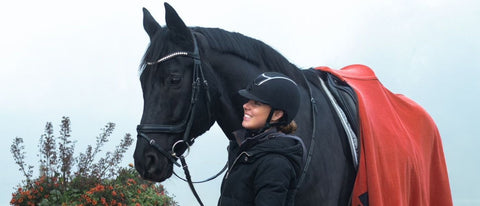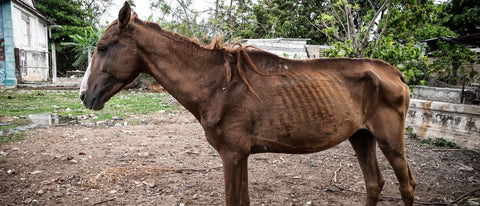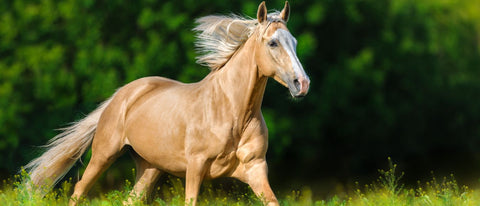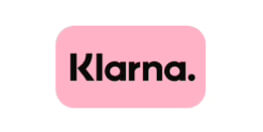
Florian ist aufgewachsen auf einem Bauernhof. Umgeben von Pferden, entdeckte er früh seine Faszination für diese majestätischen Tiere. Inspiriert von seiner reitbegeisterten Mutter, entwickelte er das Nahrungsergänzungmittel - Pferdegold. Seine tiefe Verbundenheit zur Natur und die leidenschaftliche Hingabe zu Pferden trieben ihn an, sein Unternehmen zu gründen.
But did you know that the sun in particular plays a key role in your horse's health?
Because it enables the production of vitamin D, an essential nutrient for bones, muscles and the immune system.
In this guide, you'll learn everything you need to know about vitamin D in horses, why it's so important, and how to ensure your horse gets enough of it.
Pferdegold is here to help you with advice and support to support your horse's well-being through targeted nutrient intake!

Why is vitamin D important for horses?
Vitamin D is not just a vitamin, but a real all-rounder for the health of your horse .
It not only supports bone structure, but also muscle strength and the immune system .
This makes this vitamin indispensable for your horse’s vitality and performance.
The main differences between vitamin D2 and D3 at a glance
Vitamin D2 (ergocalciferol) comes from plant sources , while vitamin D3 (cholecalciferol) is produced on the skin through exposure to sunlight .
Vitamin D3 is more efficient and effective for horses because it can increase vitamin D levels in the body faster and maintain them for longer.
This is especially important to prevent deficiencies and protect your horse's health.

Perfect for your horse: Pferdegold® supplementary feed!
These specially developed supplements support your horse's diet and provide it with natural nutrients. Made in Germany, grain-free and drug-free, they come with a 30-day money-back guarantee.
Try it now!How important is sunlight for vitamin D synthesis?
Sunlight is essential for vitamin D synthesis in horses.
The sun's UVB radiation allows the horse to produce vitamin D3, which is essential for the absorption of calcium and phosphorus .
Without sufficient sunlight, a deficiency can occur that can affect the horse's health.
It is therefore important that your horse regularly spends time outdoors in order to produce enough vitamin D.
This is how the vitamin regulates the calcium-phosphorus balance of horses
Vitamin D plays a central role in the regulation of calcium-phosphorus balance.
This balance is the foundation for strong bones and efficient energy transfer in every cell.
It promotes the absorption of these minerals in the intestine, which is essential for the development and maintenance of bones and teeth.
A balanced calcium-phosphorus balance is therefore the basic prerequisite for the horse's performance.
Why should you combine vitamin D with vitamin K?
The combination of vitamin D with vitamin K3 creates a truly powerful duo for your horse. But why exactly should vitamin K be added to vitamin D?
Vitamin K enhances the positive effects of vitamin D and ensures that calcium is efficiently stored in the bones, which forms the foundation for a strong skeleton.
Together they can significantly reduce the risk of bone problems.
But be careful: the balance between vitamin D and vitamin K must be carefully considered in order to fully exploit the synergistic effects.
For horses, vitamin K is mainly found in fresh green fodder, such as grass and hay, as well as in certain oilseeds and grains.

Daily requirement of vitamin D
The daily requirement of vitamin D varies depending on the horse's age , health, and living conditions . Generally, horses need about 500 IU (International Units) of vitamin D3 per day .
However, according to Horse Journals , a horse weighing 500 kilograms should receive around 3300 IU/day to stay in top condition.
This amount can be achieved through five to eight hours of daily sunlight exposure under optimal conditions.
However, the daily requirement of vitamin D may increase, especially if the horse receives little sunlight.
Therefore, it is essential not to exceed the maximum daily dose of vitamin D to avoid overdose. To find out the maximum daily dose for your horse, it is best to consult your trusted veterinarian.
Increased need: signs and causes
An increased need for vitamin D can be triggered by various factors.
Here are some signs and causes :
-
Lack of sun exposure: Horses that spend little time outdoors in the pasture or paddock can develop a vitamin D deficiency.
-
Season: In winter, when the sun's rays are weaker, the need for vitamin D may increase.
-
Age: Older horses and foals may have higher requirements because their metabolism and ability to produce vitamin D may decrease.
-
Health status: Certain diseases, particularly those that impair the ability to synthesize or absorb vitamin D, may increase vitamin D requirements.
-
Pregnancy and lactation: Pregnant or lactating mares may also have an increased need for vitamin D to meet both their own needs and those of the foal.
It is important to pay attention to these factors and, if necessary, adjust vitamin D intake to support the horse's health.

When is it advisable to supplement vitamin D?
Supplementing vitamin D may be particularly advisable if your horse does not get enough sunlight , as sunlight is one of the main sources of vitamin D.
Even in the winter months , when the days are shorter, supplemental intake can be beneficial . Some feeds contain vitamin D, so it's important to know what vitamin D is in order to optimize your horse's diet.
How do deficiency symptoms manifest themselves in horses?
A vitamin D deficiency in horses can cause various symptoms that can affect the well-being and health of your four-legged friend.
The most common symptoms of vitamin D deficiency in horses include:
-
Weak bones: Vitamin D is essential for bone health, and a deficiency can lead to brittle and weak bones.
-
Muscle problems: Horses may experience weakness and muscle wasting because vitamin D plays an important role in muscle strength.
-
Immune system weakness: A vitamin D deficiency can weaken the immune system and make the horse more susceptible to infections.
-
Weight problems: Difficulty maintaining weight can also be a sign of a deficiency.
Vitamin D overdose: What are its effects on horses?
An overdose of vitamin D in horses should not be underestimated and can cause serious health problems.
Too much vitamin D can lead to increased calcium concentration in the blood , which in turn can cause kidney problems, cardiac arrhythmias and calcium deposits in the blood vessels and organs.
Therefore, it is important to find the right dosage and have your horse's vitamin D levels checked regularly to avoid overdose and protect your horse's health.
Conclusion
Vitamin D is a real ray of sunshine for your horse's health! It not only strengthens bones and muscles but also supports your four-legged friend's immune system.
With sufficient sunlight and a balanced diet, you are already laying a solid foundation.
And if necessary, a targeted addition of vitamins and minerals can help your horse gallop through life full of energy and vitality.
Be sure to keep an eye on vitamin D levels and consult a veterinarian if necessary.
Providing your horse with the best possible care will ensure that you and your horse can experience many happy moments together.
FAQ
Can my horse get vitamin D from food?
Yes, horses can also absorb vitamin D through their diet, but sunlight is the main source of this vitamin.
Certain forages such as alfalfa and clover contain small amounts of vitamin D, but adequate sun remains essential.
How can I tell if my horse is getting enough sunlight?
The ideal amount of sunlight for horses is about five to eight hours per day under optimal conditions.
If your horse spends less time outdoors, especially in winter, you should have his vitamin D status checked.
Can a vitamin D overdose in horses be reversed?
An overdose of vitamin D can cause serious health problems in horses. If you suspect an overdose, you should contact a veterinarian immediately.
Treatment may vary depending on the severity of the overdose and may include medication, special diets, or supportive therapies to reduce the effects of the overdose and restore the balance of vitamins in the body.
Discover more about the essential nutrients for a horse:
- Feeding horses optimally and naturally » That's what matters!
- Bones in horses » Anatomy & bone structure in focus
- Strengthening a horse's immune system: Home remedies & tips

















